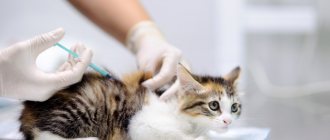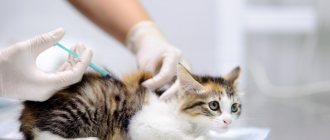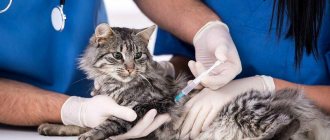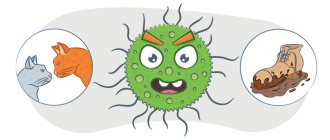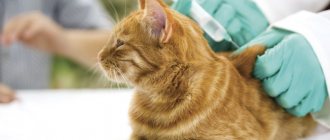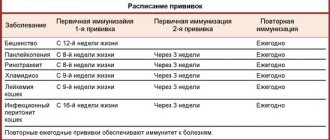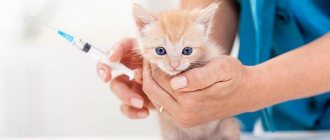Recent advances in veterinary medicine have led to an increase in the number of vaccines available for cats. Measures to ensure the safety and effectiveness of immunizing drugs are constantly being improved. There are 2 types of vaccination - basic and additional. Basic drugs should be administered to all animals without exception; additional drugs are used selectively, in accordance with the environment and lifestyle of the pet. The set of basic vaccinations for cats varies depending on the country of residence.
Cost of vaccination
| Unit measurements | price, rub. | |
| Vaccination without rabies (without vaccine cost) | 1 animal | 500 |
| Rabies vaccination (without vaccine cost) | 1 animal | 500 |
| Administration of immune drugs (without the cost of the drug) | 1. Introduction | 200 |
| Vaccination against dermatophytoses (without vaccine cost) | 1 animal | 300 |
Vaccinations against the following infections are used as the main ones on the territory of the Russian Federation:
- panleukopenia (distemper) caused by feline parvovirus;
- viral rhinotracheitis, also known as herpesvirus type I;
- feline calicivirus disease, caused by various strains of feline caliciviruses.
Non-core (discretionary or elective) vaccines are required for kittens and cats at high risk for specific diseases. Their list includes:
- feline chlamydia;
- feline leukemia;
- infectious peritonitis of cats;
- bordetellosis;
- rabies.
Feline vaccines, which are not routinely recommended by leading veterinary associations but may be appropriate under certain conditions, prevent the following diseases:
- giardiasis;
- ringworm.
Preliminary procedures
Before carrying out the manipulation, you should prepare so that no problems or complications arise after vaccination. The first thing you need to do is buy a dewormer. It is best to consult a doctor about the drug. Next you will need to treat the four-legged dog for fleas and ticks. After three days, the cat should be thoroughly bathed. The shampoo must be intended for animals so that the cat does not develop poisoning or allergies. It should be remembered that cosmetics for people are not always suitable for pets. After this, you can go to the veterinarian, who will conduct an examination and give the go-ahead for the procedure.
They may refuse if:
- The animal is sick or has recently been ill.
- For some reason the cat has a weakened immune system.
- The cat is pregnant.
- The cat recently gave birth.
- Kittens are up to two months old.
In this case, the doctor will tell you when you can come again to be sure to get vaccinated.
What is the difference between different types of vaccines
There are three main types of vaccines:
- Modified (live). Contains living organisms that have been weakened or genetically modified so that they are unable to cause disease, but can reproduce in the body of cats. These agents induce stronger and longer-lasting immunity than inactivated vaccines. They are not recommended for use on animals whose immune systems do not work properly (for example, cats infected with the immunodeficiency virus or suffering from other diseases).
- Killed (inactivated). Made using original or genetically modified bacteria that have been killed using various methods. They do not provide as high a level of protection as live drugs, so they may contain an adjuvant (added ingredient) that makes the immune response stronger.
- Recombinant. Preparations in this group include only certain specific structures of a pathogenic strain, implanted into a microorganism that is safe for cats.
Vaccinations for cats are comprehensive. In this case, protection against several diseases is achieved with one injection. Some vaccines are available in intranasal form (drops in the nose), but most are administered by injection.
Complex vaccination for cats at Alisavet is:
- hypoallergenic imported complex vaccination for cats
- Same day procedure
- injection and paperwork in 10 minutes
Select a vaccine and register your cat for vaccination
Click on the button below and fill out an application if:
- the pet has not been vaccinated previously;
- you don’t know what vaccine you need;
- or a different brand of vaccine was used.
We will call you back and offer options for solving the problem, and also calculate the final cost of vaccination in advance.
I want to vaccinate my cat, but I don’t know how or with what
When should a cat be vaccinated?
Kittens are vaccinated for the first time at the age of 6–8 weeks, and the subsequent vaccination of the cat is carried out at 10–12 weeks, then at 14–16 weeks. Immunity to rabies and other diseases does not develop instantly. This requires at least 7–10 days. During this period, the animal is not protected from infection. It is recommended to limit his contacts with other representatives of the species.
It is important to remember that vaccination given too early may not produce the required response. The fact is that the infection that has entered the body will be destroyed by the antibodies that the kitten inherited from the mother. In this case, permanent protection will not be developed. On average, the concentration of maternal antibodies decreases by the 6th week of life, but in 6% of kittens it remains at a high level until 18–20 weeks.
Most adult cats who have completed their full course of childhood vaccinations should be re-vaccinated every 1 to 3 years. The period is determined based on an assessment of the risk of infection. For free-ranging animals, the common practice is to administer core vaccines every 3 years and additional ones every year. This schedule may be changed at the discretion of the veterinarian observing the animal.
How much does a comprehensive vaccination for a cat cost?
We give a 100% guarantee that for more than 10 years, the Alisavet network of veterinary clinics has been purchasing imported vaccines with all the necessary documents only from reliable and time-tested suppliers. All bottles are brought to us in special containers subject to temperature control.
We believe that any preventative treatment should be available to you. Therefore, we do not inflate the cost of high-quality vaccines, correctly executed documents, examination and the procedure itself.
Registration of a veterinary passport is not included in the cost of vaccination and is paid separately, since many pets already have this document
Are vaccinations guaranteed to protect a cat from diseases?
With the help of vaccinations, a high level of immune protection is achieved, allowing one to prevent the disease in 95% of cases. Unfortunately, there are situations in which vaccination is not effective enough. These include the following:
- Mutation of viral strains. The causative agents of infectious diseases are capable of changing, adapting to environmental conditions. Sometimes these changes are so significant that the immune system of the vaccinated cat ceases to recognize the virus. Available vaccines can only partially protect against some of these strains.
- Maternal antibodies. Kittens acquire antibodies from their mother. They may block the effects of your kitten's vaccinations. This effect decreases over time as maternal antibodies gradually disappear.
- Carrying out vaccinations against the background of stress or illness. Mental stress or physical illness may make it impossible to respond well to vaccination. For this reason, it is best to place the kitten in its new home five to seven days before the procedure. Immediately before injecting the drug, the veterinarian should examine the baby and rule out the presence of painful conditions.
In some cases, immunizing your cat may not completely prevent the disease. However, in an animal that has received vaccinations, it occurs in a milder form. It may seem that the vaccine did not work, but without it the pathology would be much more severe.
Types of vaccines
The drugs used to vaccinate cats help protect animals from various diseases. But it is worth considering that they are divided into varieties that have some characteristics.
Vaccinal drugs can be classified according to the degree of impact. According to these criteria they can be:
- monovalent . The effect of drugs of this type is aimed at developing immunity to a specific disease;
- polyvalent . When vaccines of this type are administered, cats and kittens develop immunity to several diseases.
Vaccines are also divided into groups according to the duration of their effect:
- active . The drug contains live but weak viral organisms that do not pose a high danger to cats. About a week after the vaccine is administered, the animal develops immunity with a long-lasting effect on pathogens;
- inactivated . Preparations of this type are produced on the basis of dead viral organisms. It is for this reason that animals develop immunity almost immediately after receiving the medicine. However, it exists for a short period of time.
Dead and live vaccines
In order for a pet owner to be able to choose a high-quality and effective vaccine, it is imperative to consider the popular live and dead vaccines. There are many drugs, they may differ in action and composition.
Important! At the appointment, the veterinarian should tell you about the popular vaccines that are used to vaccinate cats and kittens. He must explain their effect and indicate the duration.
The table below shows popular dead and live vaccines.
| Dead | Alive |
| Multifel-4. This is a Russian-made drug that belongs to inactive vaccines. The medicine protects the animal from 4 infectious diseases - rhinotracheitis, calcivirus infection, panleukopenia and chlamydia. | Leucorifelin. A live drug that provides high protection against such dangerous diseases as panleukopenia, rhinotracheitis, calicivirosis. Contains live viruses of these diseases. |
| Felovax (Fel-O-Vax). The inactive drug provides high protection to the animal from dangerous ailments that are widespread among representatives of the cat family. | Nobivac FORCAT. An effective vaccine that ensures the development of immunity in representatives of the cat family to various dangerous diseases - panleukopenia, rhinotracheitis, calicivirus and chlamydia. The first injection can be given at 8 weeks. Revaccination is carried out after 3-4 weeks. |
| Nobivak for cats (rabies). A dead vaccine that protects mustachioed pets from rabies. | Purevax. An effective American-made vaccine that protects against 4 common diseases in cats. Develops immunity to peritonitis. |
| ChlamiCon. An inactive vaccine, which is intended to develop immunity in cats and kittens to chlamydia. | Vakderm. Live vaccines that provide the immune system with lichen. A cat's lichen vaccination is performed at 1.5 months. |
| Rabizin. A drug that protects animals from rabies. It contains a dead strain of the rabies virus. | Purevax FeLV. A live drug used to vaccinate against leukemia for cats. |
There are also mixed vaccines that are used to vaccinate against plague and toxoplasmosis. The most popular complex drugs include the following:
- Nobivak Tricat Trio . A complex vaccine that protects the animal from distemper, from rhinotracheitis viruses, calicivirus, and from coronovirus;
- Purevax RCP and RCPCh . Combined preparations that contain inactive and active strains of viruses of dangerous cat diseases. Protects against panleukopenia, rhinotracheitis, chlamydia, calcivirosis.
See also - Vaccines for cats by disease.
Which vaccinations are most important?
The answer to this question depends on individual circumstances, including the area where you live and the cat's lifestyle. Your veterinarian will be able to advise on the most appropriate immunization schedule. Below is a list of diseases that pose the greatest danger to a cat:
- Feline panleukopenia infection. This disease is rare today due to widespread vaccination, but the risk of its occurrence remains. The disease occurs in the form of severe, often fatal gastroenteritis with severe dehydration. The infection is very contagious and easily transmitted. Vaccination provides a high level of protection.
- Feline respiratory viral infection. A very common infection in unvaccinated cats. May cause delayed complications. The vaccine is moderately effective because immunity to these viruses is short-term and unstable. Vaccination reduces the severity and duration of the disease, but does not always prevent it completely.
- Feline chlamydia. It is a bacterial process caused by Chlamydophila felis that causes painful inflammation and swelling of the conjunctiva or membrane around the eye, as well as upper respiratory tract infections. May cause infertility. Vaccination completely eliminates the risk of infection.
- Feline leukosis. This virus is widespread. Infected animals die either from tumors or from damage to the immune system. Modern vaccines provide a good level of protection.
- Feline infectious peritonitis. It is caused by coronavirus. More often, the infection occurs in the form of carriage, but under certain conditions a full-blown clinical picture develops, and the pet may die.
- Rabies. The disease almost always leads to death soon after the first symptoms appear. A bite from an infected animal can spread the infection to people. A vaccine intended to combat rabies should be administered to all cats that come into contact with representatives of any species.
When should Britons get vaccinated, schedule
The vaccination scheme for British cats, like other cats, is similar. The components of the vaccines depend on the future kitten: whether it will participate in procreation, live only in an apartment, house, or go outside.
What to do before vaccination:
- Deworming, treatment for skin parasites for 12 - 14 days;
- The kitten must be clinically healthy and examined by a veterinarian.
At what age is vaccination carried out:
- The first comprehensive vaccination for kittens is given at 8 - 9 weeks;
- The second complex vaccination for a British kitten is revaccination with the same vaccine, given after 2 - 4 weeks, depending on the vaccination;
- The rabies vaccination for a Briton is carried out no earlier than 3 months, without revaccination;
- The third complex vaccination is given to the cat a year after the second complex vaccination, then once a year;
- The second rabies vaccination is a year after the first rabies vaccination, then once a year.
If the vaccination schedule is violated, you should consult a veterinarian.
Adverse reactions after vaccination are possible, but this is rare. Vaccination is still more beneficial than harmful. Veterinarians can help with such reactions.
Risks after vaccination:
- Fever;
- Refusal to eat, lethargy;
- Encephalitis and polyneuritis;
- Changes in behavior, seizures;
- Arthritis, pain at the injection site;
- Change in fur color at the injection site, hair loss;
- Allergic, immune reactions: neoplasms at the injection site, reactions due to improper administration, inability to develop immunity after administration of the vaccine.
How can a veterinarian help your kitten?
Veterinary doctors specialize in providing medical care in a comfortable home environment that only the owner can create. This is why administering injections at home is so important. After the injection, the cat can immediately fall into the hands of a caring owner, who will console him and, of course, give him a treat. Having a doctor visit your home is very convenient, just check out our advantages:
- You don't waste time visiting the veterinary center.
- You can get modern doctor's help.
- Avoid nervous sitting in line.
- You can communicate more productively with a specialist.
All these advantages prevail over the advantages of staying in a regular veterinary clinic. very convenient that you can donate blood, if necessary, at your home. Of course, preparation for analysis will also be required, but that’s a completely different story. Caring for straight-eared and lop-eared kittens is slightly different , since lop-eared kittens have a more weakened immune system. A veterinarian from our Ya-Vet center will also give recommendations on caring for the kitten in the period after the vaccine.
Is it necessary to vaccinate a kitten?
Owners of small pets often doubt whether they should vaccinate Scottish kittens living at home.
At the age of 2-3 months, without mother's milk, their immunity is weakened. If there are no serious contraindications, animals must be vaccinated. The age of 8-12 weeks is optimal, later the kittens begin to cut their teeth. Keeping your pet indoors and not having contact with other animals does not guarantee safety. Owners on clothes or shoes can bring an infection or virus into the house. There is a possibility that the cat will accidentally jump out into the street.
Rabies is transmitted through saliva by a bite. It is impossible to save an unvaccinated animal; it poses a danger to others. You can become infected at exhibitions, in a veterinary hospital, from wild rodents, or while living in the private sector.
Viral infections, against which vaccinations are carried out at an early age, are very dangerous for young organisms and have a high mortality rate: calcivirosis - 30%, rhinotracheitis - 30%, panleukopenia - 50%. Scots, like other purebred cats, have lower immunity compared to mestizos.
Benefits of vaccination:
- regular vaccinations develop lasting immunity to dangerous pathologies;
- if a Scot gets sick after vaccination, the disease is mild, without complications;
- safety of family members, some cat diseases are dangerous to humans;
- a vaccinated cat transfers immunity to kittens in the first days of life;
- You can take your pet on trips or visit a veterinary clinic without fear for its health.
Vaccination of Scottish cats is mandatory if the animal is planning to participate in exhibitions or produce offspring.
Do Scottish Fold kittens who are always at home need vaccinations?
First, let’s answer the question: “How does a Scottish kitten become infected if it is at home?” Various options are possible. Therefore, the question of whether a Scot should be vaccinated is definitely important to decide as soon as possible. For example, the infection can be brought by owners from outdoor shoes. Or, for example, if a kitten sleeps on the doormat , where a person’s foot first steps when he comes home. So even such little things are enough for a young Scottish cat to get sick. That’s how fragile the immune system is in these cute creatures with touchingly floppy ears. A baby can also get sick while in a veterinary center, because there are a lot of sick animals here. Remember that vaccinations for Scottish Fold kittens are not able to protect your pet 100% from diseases, however, they will create decent basic protection, which will subsequently create a strong and healthy immune system.
